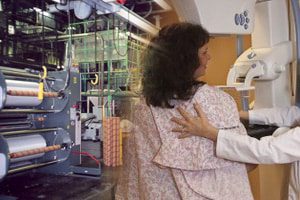
Women in the plastics industry or in the manufacture of plastic automotive parts and components face a significantly higher risk of developing breast cancer later in life, according to the results of a new study. PlasticsNews.com reports that Health Canada along with other health groups in the country have funded research examining breast cancer rates […]
 Women in the plastics industry or in the manufacture of plastic automotive parts and components face a significantly higher risk of developing breast cancer later in life, according to the results of a new study.
Women in the plastics industry or in the manufacture of plastic automotive parts and components face a significantly higher risk of developing breast cancer later in life, according to the results of a new study.
PlasticsNews.com reports that Health Canada along with other health groups in the country have funded research examining breast cancer rates by occupation among women living in several counties of Ontario, Canada. The study was published recently in Journal of Environmental Health. In conclusion, the study found that women who worked in jobs that make plastic injection molded parts for the automotive industry faced a five times greater risk of being diagnosed with breast cancer.
Specifically, the study examined several thousand women, including women from Essex and Kent counties who had already been diagnosed with breast cancer against those who hadn’t been diagnosed with the life-threatening condition. Among the 1,006 women who participated that were diagnosed with breast cancer (versus the 1,146 women who participated in the study that were cancer-free), a total of 26 had been previously employed in the automotive plastics industry.
The study states, “One year in plastics employment is estimated to increase the odds of breast cancer by 9 percent. It also states, “excess breast cancer” rates are “largely limited to small automotive parts suppliers, which would include some plastics operations.” The study does stop short of drawing a direct link between exposure to these chemicals and an increased rate of breast cancer but found an association between exposures to chemicals largely used in those occupations and the disease.
The plastics and chemicals industry in the U.S. has not taken well to this latest study that finds harmful effects come to those who are exposed to high levels of many industrial chemicals and other agents. The American Chemistry Council told PlasticsNews.com that it found the results of the Canadian study to be an overreach, saying the research fails to identify any specific chemicals that may be triggering that exposure rate and does not account for other potential risk factors the women participating in the study may have had.
This is however, another study that finds harmful effects of exposure – especially at high levels – to industrial chemicals, solvents, and other agents, specifically in the plastics industry. In fact, the same American Chemistry Council has continually debated the studies that cast a negative light on bisphenol A (BPA), a specific plastics chemical that’s been linked to an array of side effects.
The study did note that some of the chemicals examined for the study and those used in the automotive plastics industry have been tabbed as “endocrine-disrupting” agents that could impact risk factors for cancer.


